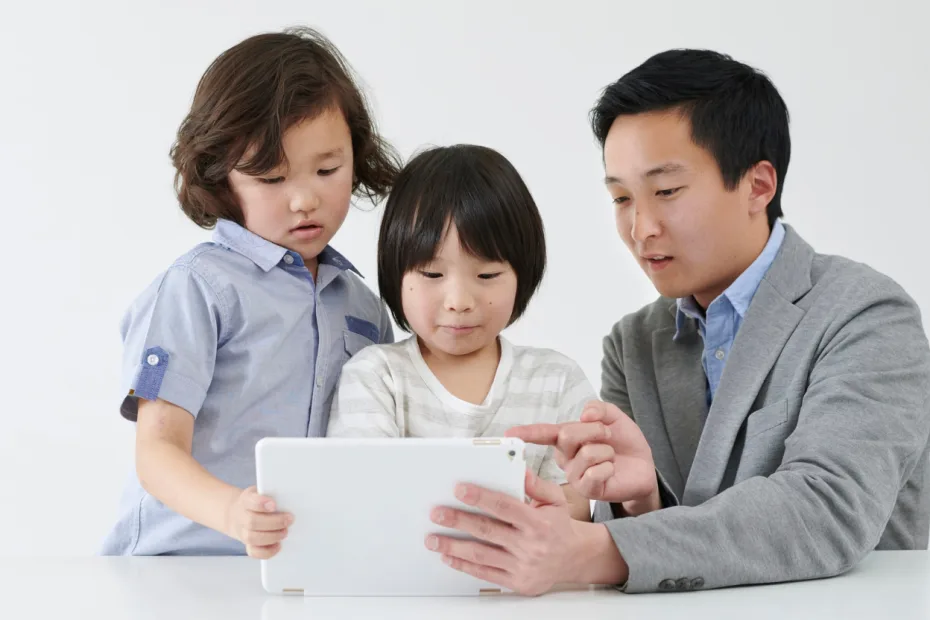The world today is a digital environment where even low cost smartphones give access to an online source of information that no generation has ever had before.
Children can have these devices at their fingertips from such an early age, and while these tools provide opportunities for education and knowledge they also come with risks and challenges.
The main challenge for parents is how to navigate this new landscape to protect their children from all the unfiltered online dangers, so hopefully this guide will give some advice on screen time control, privacy, security and prevention of cyberbullying or worse.
Understanding Screen Time
For those of us older parents, screen time control was a matter of turning off the TV, or a bit later pulling the plug on video games. Today as handheld internet-connected devices are ubiquitous it is not so simple.
Pediatricians recommend that kids aged 2 to 5 should have a maximum of 1 hour of online screen time per day, even if its children’s programs. For older children there needs to be clear boundaries depending on their individual needs.
Parents can see this as a way to encourage more quality time with their children, with breaks to discuss what the kids have been watching, maybe some outdoor activities, or indoor games such as board games. Such breaks are very important for young bodies since prolonged sedentary screen time can lead to eye strain and lack of muscle development, along with social isolation.
Encouraging hobbies that don’t involve computer screens are useful, and while there may be some initial resistance, quality family interactions will assist in developing healthy habits.
Online Security
Most kids generally feel bulletproof and sometimes learn otherwise “the hard way”. Right from the start they need to understand the importance of privacy when it comes to sharing personal information especially on social media platforms like Facebook and Instagram.
They need to know the dangers of having their privacy invaded, and why they should safeguard details such as their home address, phone numbers, or their school’s name, even with friends. Identity theft and cyberbullying are unfortunately all too common occurrences in the world today.
Most kids love having secrets and can be easily encouraged to create complicated passwords, and not share them with anyone else. My own daughter has a 10 character password that she always seems able to remember, whereas I have to rely on something simple like my birthdate!
In cases of real concern parents can use Parental Control software which gives them the ability to access their kid’s screens remotely, able to monitor and limit what the kids are accessing online. This has to be handled very carefully, since it may make the child feel they are being “spied on” and can be a possible source of conflict. The use of such software (which is easily downloaded online) must be explained to the kids openly as part of the effort to ensure safer online experiences.
Preventing Cyberbullying
Cyberbullying is a relatively new phenomenon and is usually described as a persistent attack on a child through online media such as group sites, messaging systems, and social media in general. As adults we can choose to ignore it but for children it is a source of anxiety and can result in serious emotional damage, even leading to self-harm in extreme cases.
Parents need to be proactive and not wait for it to happen. Open and frank dialogue is critical, and the child should know that they can always talk to you without judgment and without penalties such as loss of online privileges – that would just end up in an atmosphere of secrecy and denial.
Both the child and their parents should be able to recognise cyberbullying behaviour like rumour spreading, abusive messages, or inappropriate images.
Whether your child is the target of online bullying or is in fact involved in it, they should understand the hurt such actions can cause, and parents should set an example of empathy and kindness both online and offline.
In serious cases the parents should support the kids and ensure the behaviour is reported to the correct authorities, whether school officials or law enforcement. Such claims will not just be dismissed, the authorities already understand it is a serious issue.
Develop Responsible Online Habits
Finally, think about getting children to understand the power of the internet and how they must take responsibility for their interactions online. They need to know that whatever they put on a site like Facebook could be accessed in the future, perhaps by an employer or other authorities, with lasting consequences to their reputations and possible future opportunities.
Another factor is the prevalence of conspiracy theorists on the internet, from claims of “faked” moon landings to flat earth societies. Many of these are harmless but some can be serious and kids need to learn how to find trustworthy sources of information, and learn critical thinking to avoid being caught up in conspiracies and cults.
In Conclusion
The online world exploded into being from the late 1990’s onwards, and generations born since then face an increasingly complex world of information and misinformation. Naturally children should not be left to navigate this by themselves, andt they desperately need parental help to manage their screen time, ensure privacy and security, and avoid perils like cyberbullying.
It is up to parents to make sure the kids are fully equipped with all the tools and knowledge they require to thrive in the online environment, in an atmosphere of openness and empathy, so they are not only empowered but also develop into responsible online citizens.
